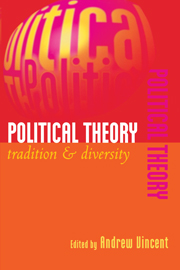Book contents
- Frontmatter
- Contents
- Preface
- List of Contributors
- Introduction
- 1 Political Theory and Conceptual Change
- 2 Political Theory and the Problem of Anachronism
- 3 Utilitarianism as a Public Philosophy
- 4 Rational Choice Political Theory
- 5 Republican Political Theory
- 6 Liberalism, Multiculturalism and Oppression
- 7 Postcolonialism and Political Theory
- 8 Legal Positivism and Political Power
- 9 Political Theory, International Theory, and the Political Theory of International Relations
- 10 Method Matters: Feminism, Interpretation and Politics
- 11 The Political Philosophy of Deleuze and Guattari
- 12 The Object of Political Theory
- Index
1 - Political Theory and Conceptual Change
Published online by Cambridge University Press: 29 March 2011
- Frontmatter
- Contents
- Preface
- List of Contributors
- Introduction
- 1 Political Theory and Conceptual Change
- 2 Political Theory and the Problem of Anachronism
- 3 Utilitarianism as a Public Philosophy
- 4 Rational Choice Political Theory
- 5 Republican Political Theory
- 6 Liberalism, Multiculturalism and Oppression
- 7 Postcolonialism and Political Theory
- 8 Legal Positivism and Political Power
- 9 Political Theory, International Theory, and the Political Theory of International Relations
- 10 Method Matters: Feminism, Interpretation and Politics
- 11 The Political Philosophy of Deleuze and Guattari
- 12 The Object of Political Theory
- Index
Summary
The end of a century, and more especially the end of a millennium, is surely a propitious time to look back, to take stock: to see where political theory has been, where it is now, and where it might be headed. This is obviously too tall an order to fill in a single chapter, and I happily leave that daunting task to my fellow contributors to the present volume. My task here is the much more modest one of tracing a number of twists and kinks in the ‘linguistic turn’ in political theory. Over the last half-century or so, the study of political theory in Britain and North America has moved away from ‘linguistic (or conceptual) analysis’ and toward ‘conceptual history’, amongst other approaches. A re-viewing of these developments from the vantage-point of the present might shed some light on the problems and prospects of political theory on the eve of the third millennium.
I plan to proceed in the following way. First I shall sketch, with as few strokes as possible, a potted (and partial) history of the ‘linguistic turn’ in twentieth-century political theory. That story is, in part and very roughly, a tale about the transition from ‘conceptual analysis’ to ‘conceptual history’. Then I shall outline what one might (with some slight exaggeration) call two ‘schools’ of, or ‘approaches’ to, conceptual history – the German Begriffsgeschichte and its Anglo-American counterpart, with particular emphasis on the latter.
- Type
- Chapter
- Information
- Political TheoryTradition and Diversity, pp. 28 - 44Publisher: Cambridge University PressPrint publication year: 1997
- 2
- Cited by



